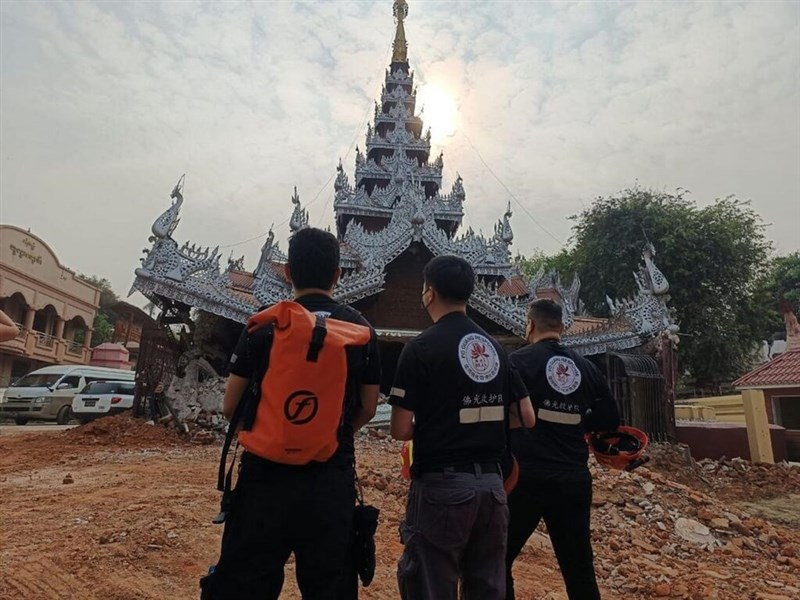In the aftermath of the devastating 8.2-magnitude earthquake that struck Myanmar on March 28, 2025, leaving a trail of destruction across multiple regions, two prominent Taiwan-based Buddhist charity organizations have mobilized rapid humanitarian relief efforts. These missions go beyond the immediate act of compassion — they reflect Taiwan’s strategic soft power diplomacy and Asia’s growing interreligious humanitarian cooperation.
The earthquake has claimed the lives of over 3,400 people, left 214 missing, and injured more than 4,600, as reported by the Myanmar government. Entire communities have been displaced, with critical infrastructure — including homes, hospitals, and roads — reduced to rubble.
Fo Guang Shan Monastery’s Ground Response
The Fo Guang Shan Monastery, known globally for its social outreach rooted in Humanistic Buddhism, announced that it dispatched a relief team composed of volunteers from Fo Guang Shan (Malaysia) Rescue Team and Yayasan Sin Chew, a Malaysian-based charity partner. The team arrived in Mandalay on Friday, April 4, carrying 3.3 tons of emergency supplies, including:
- Ready-to-eat food packets
- Excavation tools to assist in debris clearing and search efforts
- Medical kits for basic first aid and trauma care
This team was personally led by Master Hsin Bao, the abbot of Fo Guang Shan, reinforcing the monastery’s philosophy of “Compassion in Action.” Master Hsin Bao highlighted that “Buddhist compassion means being present where the suffering is greatest,” during a short press briefing.
This mission marks one of the few religiously organized relief efforts that reached Mandalay — Myanmar’s second-largest city — where aftershocks and collapsed infrastructure have hampered access to remote communities.
Tzu Chi Foundation’s Aerial Aid Shipment
In a parallel and equally impactful effort, the Tzu Chi Foundation, another renowned Taiwanese Buddhist humanitarian NGO, confirmed on Monday that it had air-shipped large quantities of emergency goods to Myanmar.
Their shipment included:
- 80 folding beds
- 690 blankets
- Staple food items like rice and noodles
- Basic hygiene supplies
Volunteer Chen Ching-hua (陳慶華) stated that the supplies were loaded on cargo aircraft bound for Nay Pyi Taw International Airport, a critical logistics hub now being utilized for global aid deliveries. The foundation has already mapped further logistics to send portable water filters and solar-powered lamps to regions suffering from power blackouts and water shortages.
Myanmar Opens Doors to Global Aid
In a rare act of policy flexibility, Myanmar authorities have granted international humanitarian agencies clearance to fly in aid through official channels, signaling a more open stance during this disaster.
This is notable given Myanmar’s historically tight restrictions on foreign NGO involvement, particularly since the 2021 military coup. Analysts view this as a temporary but important humanitarian window, which may help improve international engagement amid rising criticism of the regime’s handling of national disasters.
Beyond Relief: Taiwan’s Soft Power Strategy
Taiwan’s foreign policy has been largely constrained by China’s geopolitical pressure, but it has successfully carved out a global presence through “soft diplomacy” — with religious humanitarian work as one of its key tools.
- The Fo Guang Shan Monastery and Tzu Chi Foundation have long served as unofficial ambassadors, bringing Taiwanese values of compassion, efficiency, and democratic humanitarianism to regions in crisis.
- This approach helps build goodwill in countries where Taiwan lacks formal diplomatic ties, including Myanmar.
The rapid coordination between Taiwan and Malaysian partners also demonstrates the strength of pan-Asian Buddhist networks, capable of bypassing political bottlenecks to bring real-world help to people in need.
Looking Ahead
Both organizations have pledged ongoing support for the people of Myanmar. Long-term aid is being planned, which could include:
- Temporary shelters
- Community kitchens
- Psychological counseling and spiritual support services
As international agencies assess the full scale of the disaster, Taiwanese Buddhist groups remain among the most proactive and respected responders on the ground.
FAQs
Which Taiwanese organizations sent aid to Myanmar after the earthquake?
Fo Guang Shan Monastery and Tzu Chi Foundation — both major Buddhist charities based in Taiwan — sent emergency relief.
What kind of aid was delivered by these organizations?
Food, medical kits, excavation tools, blankets, beds, and hygiene items were provided.
Who led the Fo Guang Shan relief mission?
Master Hsin Bao, the abbot of Fo Guang Shan Monastery, personally led the relief mission in Mandalay.
How was the aid transported to Myanmar?
Fo Guang Shan’s team arrived via ground transport, while Tzu Chi air-shipped supplies to Nay Pyi Taw International Airport.
Why is this aid mission significant beyond humanitarian work?
It showcases Taiwan’s soft diplomacy and the role of religious NGOs in international crisis management, especially where formal diplomatic ties are limited.
Are more aid missions expected from these groups?
Yes, both organizations have pledged continued relief, including long-term support and rebuilding assistance.


